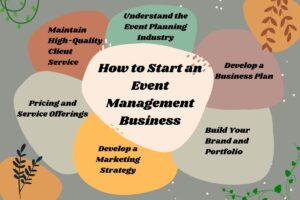Starting an event management business can be both exciting and rewarding. As the demand for professionally organized events continues to rise—from corporate conferences and weddings to festivals and private parties—there’s never been a better time to enter this booming industry. Whether you’re passionate about planning large-scale corporate events or love the creativity of organizing weddings and social gatherings, learning how to start an event management business will set you on the path to success.
In this guide, I’ll cover the essential steps to launching your own event planning company. I will include how to find your niche, develop a business plan, build a portfolio, and market your services. By the end, you’ll be ready to turn your passion for organizing events into a thriving business.
How to Start an Event Management Business? A Complete Guide
It requires a blend of creativity, organization, and business savvy to start an event planning business. This complete guide will walk you through every essential step so that you can launch and grow a successful event management business with the least glitches.

Understand the Event Planning Industry
Before diving into the event management business, it’s crucial to have a solid understanding of the industry itself. Event planners are responsible for organizing a wide variety of events, including corporate meetings, weddings, festivals, trade shows, and private parties. They handle everything from logistics and budgeting to vendor coordination and guest management, ensuring that every aspect of the event runs smoothly.
The industry is constantly evolving, with growing trends like virtual and hybrid events becoming more prominent due to advancements in technology and the lasting impact of the pandemic. There’s also a growing focus on sustainability, with more clients seeking eco-friendly solutions for their events, such as reusable decor, waste reduction strategies, and green venues. Staying updated on these trends will give you a competitive edge.
Successful event management requires a diverse skill set. Communication and negotiation are key when dealing with vendors, clients, and venues. You’ll also need to be highly organized, able to multitask, and possess strong problem-solving abilities to manage the inevitable last-minute changes or challenges that arise during events. Creativity is another important trait, allowing you to design memorable experiences that align with your clients’ visions. By understanding the expectations and demands of this industry, you can tailor your business strategy to thrive.
Develop a Business Plan
Creating a comprehensive business plan is a foundational step in starting your event management business. It serves as a roadmap that outlines your goals, strategies, and the steps needed to reach success. Start by defining your niche.
This is a critical decision that can set the tone for your brand and services. You might choose to specialize in corporate events, weddings, or social gatherings, depending on your interests, market demand, and expertise. For example, corporate event planning may focus on conferences, seminars, or product launches, while wedding planning requires a more personalized approach, dealing with couples and their unique visions for their big day.
Once your niche is clear, you’ll need to set specific business goals. These could range from financial targets like annual revenue to client acquisition goals or geographic expansion. Consider your short-term objectives as well as long-term plans for growth. Setting measurable goals helps keep you focused and provides a way to track your progress.
After choosing niche, you should choose a good event management business name. I have listed some popular ideas on event management business names. You can check these.

Budgeting is another key component of your business plan. You’ll need to account for initial startup costs, which could include expenses like registering your business, purchasing office supplies or software, marketing, and securing insurance. Estimating these costs and planning how you will cover them is crucial. A well-thought-out financial plan also includes pricing your services effectively to ensure profitability. Whether you charge a percentage of the event’s total budget, hourly rates, or offer fixed packages, your pricing should reflect the value you bring while remaining competitive.
Lastly, your business plan should include strategies for marketing and client acquisition. You’ll need to outline how you will attract clients—whether through online marketing, networking, or leveraging partnerships with vendors and venues. This business plan will serve as a blueprint, guiding the launch and growth of your event management company while helping you stay focused on your vision.
Legal and Administrative Setup
Once you’ve outlined your business plan, the next step in starting an event management business is taking care of the legal and administrative aspects. Choosing the right business structure is a critical decision as it impacts your liability, taxes, and how you can raise funds. Common structures include sole proprietorships, Limited Liability Companies (LLCs), and corporations.
A sole proprietorship is the simplest structure, ideal if you’re working alone, but it offers little protection from personal liability. LLCs, on the other hand, separate your personal assets from the business, limiting your liability and offering more flexibility with taxes. Corporations, while more complex, are often suitable for larger businesses looking to expand significantly or raise outside capital.
Once you’ve decided on the structure, the next step is to register your business with the appropriate local, state, or federal authorities. This will depend on where you plan to operate. You’ll also need to apply for any necessary permits or licenses, which could vary based on the events you plan to manage. For example, some regions require event planners to hold a specific business license or event permit, especially if you are working with public venues. Make sure to check local regulations to ensure compliance.
Insurance is another essential part of protecting your business. Event management can be high-risk, with many variables out of your control, such as vendor issues or unforeseen accidents during an event. General liability insurance is a must, covering accidents or damages during the events you manage. Event insurance can also protect you from cancellations or unforeseen problems that could result in financial losses. Consider other types of insurance, such as property insurance for your office or equipment and workers’ compensation if you plan on hiring staff. Having the right coverage will give you and your clients peace of mind, protecting your business from potential risks.
Build Your Brand and Portfolio
Once your legal and administrative setup is complete, the next step is building your brand and portfolio. Your brand identity is how potential clients will perceive your business, so it’s important to create a compelling and professional image. Start by selecting a business name that reflects your services and appeals to your target audience. A strong, memorable name can make a lasting impression and help you stand out in a competitive market. Next, invest in designing a logo that visually represents your business and its values, whether that’s creativity, professionalism, or luxury.
Your brand also needs a unique selling proposition (USP). What makes your event management business different from others? Maybe you specialize in eco-friendly events, or perhaps you offer luxury wedding planning services. Identifying your USP will help you craft a message that resonates with your ideal clients and highlights the value you bring to their events.

In the event management industry, having a strong portfolio is crucial to gaining clients’ trust. If you’re just starting out, you may not have many events to showcase, but you can build your portfolio by offering your services for free or at discounted rates for friends, family, or small local events. This will give you the opportunity to gain hands-on experience, practice your skills, and capture professional photos of your work. Make sure to collect testimonials from satisfied clients, as these can be powerful tools for establishing credibility and building trust with future clients.
With your portfolio in hand, the next step is to create an online presence. In today’s digital age, a professional website is essential for showcasing your services, portfolio, and contact information. Your website should include a clean design, easy navigation, and details about the services you offer.
Consider adding a blog where you can share tips, behind-the-scenes stories, or industry insights to position yourself as an expert in event planning. Social media platforms like Instagram, Pinterest, and LinkedIn are also valuable tools for marketing your business and connecting with potential clients. Visual platforms like Instagram are especially effective for sharing photos of past events, while LinkedIn can help you network with corporate clients. By building a strong brand and portfolio, you’ll lay the foundation for attracting clients and growing your event management business.
Establish Vendor Relationships
One of the most critical elements of a successful event management business is building strong relationships with vendors. Vendors are your key partners in delivering a seamless event experience, as they provide essential services such as catering, photography, entertainment, florals, and venues. To create memorable events that meet or exceed your client’s expectations, it’s crucial to collaborate with reliable, high-quality vendors.
Start by identifying key vendors within your niche or geographic area. If you’re specializing in weddings, you’ll need to establish connections with florists, bakers, venues, and officiants. For corporate events, you might work with audiovisual teams, corporate caterers, and conference venues. Research and reach out to vendors who have a solid reputation and offer the services your clients are likely to need. This involves networking, attending industry events, or even requesting meetings with vendor representatives to understand their offerings and build rapport.

Building strong partnerships with vendors requires trust and mutual benefit. You’ll need to negotiate contracts with clear terms, including pricing, deadlines, and service expectations, to ensure a smooth working relationship. Many event planners develop preferred vendor lists, which are vendors they frequently recommend or work with because of their reliability and high-quality service. In return, vendors may offer discounts or special rates for consistent business. Establishing these partnerships can also lead to mutual referrals—vendors may recommend you to their clients and vice versa, helping both businesses grow.
Maintaining positive relationships with vendors goes beyond initial negotiations. You’ll need to ensure clear communication throughout every event, provide feedback, and address any issues promptly. By fostering strong, collaborative partnerships, you can ensure that your events run smoothly and that both you and your vendors deliver top-tier service to your clients.
Develop a Marketing Strategy
Once your vendor relationships are established, it’s time to focus on marketing your event management business. An effective marketing strategy is crucial for attracting clients and establishing your brand in a competitive market. The first step in developing this strategy is defining your target audience. This involves identifying the types of clients who are most likely to need your services, such as engaged couples, corporations looking for conference planning, or individuals seeking help with social events. Understanding your audience’s needs, preferences, and pain points will help you tailor your marketing efforts to resonate with them.
Online marketing is an essential tool for growing your business, starting with your website. Your website should serve as the hub of your marketing efforts, showcasing your portfolio, testimonials, and service offerings. Make sure your site is optimized for search engines (SEO) so potential clients can easily find you when searching for event planners in your area. Create a blog or resources section where you can offer valuable content, such as tips for planning a successful event, trends in event design, or checklists for clients preparing for their events. This not only positions you as an expert but also improves your search engine rankings.
Social media marketing is another powerful channel for event planners. Platforms like Instagram and Pinterest are ideal for sharing visually stunning images of your past events, giving potential clients a glimpse of your style and creativity. Posting behind-the-scenes content or event highlights can also engage your audience and show your process in action. LinkedIn is a useful platform for connecting with corporate clients, sharing case studies of business events you’ve managed, and networking with industry professionals. You can also consider running targeted ads on social media to reach a wider audience based on demographics, interests, and location.
In addition to online marketing, offline marketing still holds value, especially in the event planning industry. Networking is key—attend local business events, wedding expos, and industry conferences to connect with potential clients and vendors. Create professional brochures or business cards to distribute at these events. Building relationships with venues, catering companies, and other vendors can also lead to referrals, expanding your client base.
Finally, don’t underestimate the power of word-of-mouth marketing. Satisfied clients are one of your best sources of new business. Encourage clients to leave reviews online, and consider implementing a referral program where clients receive a discount or incentive for recommending your services to others. A comprehensive marketing strategy that combines online presence, social media, networking, and word-of-mouth will help you attract clients and grow your event management business.
If you want to get rich fast, you can try some other jobs, too.
Pricing and Service Offerings
Determining your pricing structure is a key factor in starting a successful event management business. The right pricing strategy not only reflects the value of your services but also ensures that your business remains profitable. Event planners typically charge in a few different ways: hourly rates, a percentage of the total event budget, or flat-fee packages. Each model has its benefits, depending on the size and type of the event.
Hourly rates are ideal when working on smaller or more straightforward events, as they allow you to charge for the exact time spent planning. This method is transparent for clients, as they know what they’re paying for each hour of your work.
Charging a percentage of the total event budget is another common approach, especially for larger events like weddings or corporate functions. This structure works well because the complexity of the event often scales with its budget, and it allows your earnings to grow as the event size increases.
Flat-fee packages can be appealing to clients who want clear and upfront pricing. You can create different tiers of services, from basic day-of coordination to full-service event planning, where you handle every detail. These packages make it easier for clients to choose a service that fits their needs and budget while providing you with predictable revenue.
When setting your prices, research your local market to see what competitors are charging, and consider your target clients’ budget range. You want to stay competitive without underpricing yourself. Keep in mind that as you gain more experience and build a strong reputation, you can gradually raise your rates to reflect the premium service you offer. Along with pricing, consider what services you’ll offer within your packages.
Start Small, Then Scale
As with any new business, it’s a good idea to start small when launching your event management company. Focus on organizing smaller, local events at first, such as private parties, small weddings, or community events. These types of events are easier to manage and require fewer resources than large-scale corporate events or destination weddings.
Starting with smaller events allows you to build confidence, gain hands-on experience, and fine-tune your process before taking on more complex projects. It’s also an opportunity to refine your communication skills with clients and vendors and to establish a reputation in your community.
While you’re managing these smaller events, take every opportunity to gather feedback from clients and attendees. Collect reviews, ask for testimonials, and request referrals. Positive reviews and word-of-mouth recommendations are invaluable as you grow your business. As you gain experience and build your portfolio, you can gradually begin taking on larger, more elaborate events, such as corporate conferences, galas, or destination weddings.

Scaling your business may involve hiring additional staff, such as event assistants, coordinators, or even freelance specialists. Hiring help allows you to manage multiple events at once and maintain a high standard of service as your business expands.
Consider expanding your service offerings as well. You might add services such as event decor design, rentals for event supplies, or even consulting for clients who want to handle part of the event planning themselves. As your business grows, you can also expand geographically by working in new locations or specializing in destination events. By scaling your operations carefully and strategically, you can take your event management business from small local gatherings to large, high-profile events while maintaining the quality and reputation you’ve built.
Maintain High-Quality Client Service
Client satisfaction is the cornerstone of a successful event management business, and maintaining high-quality service is crucial for long-term success. Communication is key in ensuring that clients feel informed and confident throughout the planning process. From the initial consultation to the event day, keep clients updated on progress, timelines, and any challenges that arise. Clear and consistent communication helps to build trust and sets the tone for a professional relationship. It’s also important to listen actively to your client’s needs and preferences so that you can tailor your approach to meet their vision.
In the event planning industry, challenges are inevitable. Whether it’s a last-minute vendor cancellation or an unexpected weather change, you need to be able to think on your feet and solve problems quickly. Crisis management is a critical skill for event planners, as the success of an event often depends on how well you handle unforeseen issues. Always have contingency plans in place and be prepared to make quick adjustments to keep the event running smoothly. Clients will appreciate your ability to stay calm under pressure and find solutions, further solidifying their trust in your services.
After each event, take the time to gather feedback from your clients. This not only helps you improve your services but also shows that you value their opinions. Use post-event surveys or casual follow-up conversations to ask what worked well and what could be improved. Positive feedback can be turned into testimonials for your website or marketing materials, and constructive criticism can help you refine your processes.
Encouraging referrals is another way to maintain momentum in your business. Satisfied clients who have had a great experience with you are often willing to refer you to others. You can incentivize referrals by offering discounts on future services or small thank-you gifts to clients who refer new business to you. By maintaining high-quality client service, you’ll build lasting relationships, attract repeat business, and create a reputation that speaks for itself in the event planning industry.
Wrapping Up
Launching an event management business requires careful planning, strategic thinking, and a commitment to delivering exceptional experiences. By understanding the intricacies of the industry and creating a well-structured business plan, you set yourself up for success from the start. Focusing on building solid relationships with vendors and providing flexible, well-priced service offerings will help you establish a foothold in the competitive market.
As you grow, maintaining a strong brand presence and consistently meeting client expectations will be crucial to sustaining your business. Whether you’re handling intimate gatherings or large-scale corporate events, the key to success lies in attention to detail, adaptability, and creating memorable moments for your clients. With these elements in place, your event management business has the potential to flourish and grow into a thriving enterprise.







